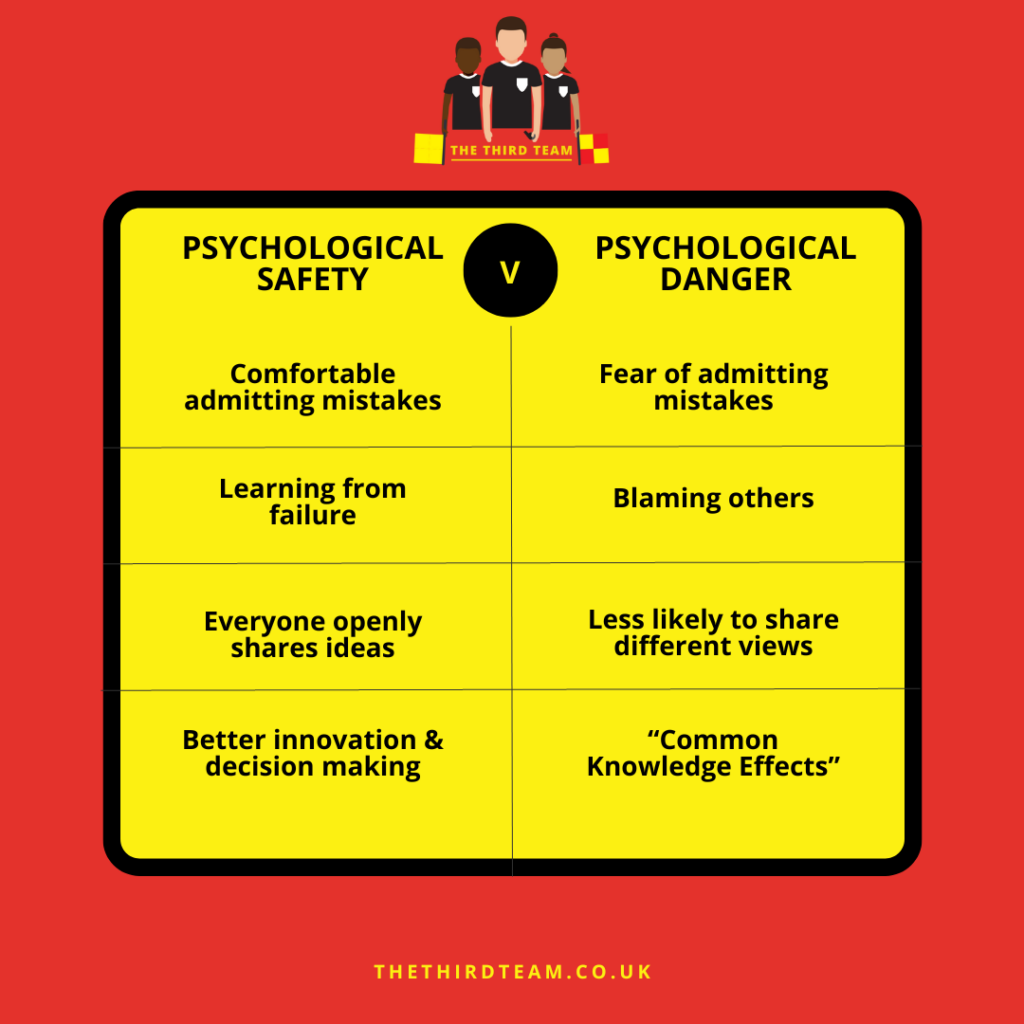Psychological safety is a relatively new concept and is getting more traction in of late in sport psychology.
However, many people in refereeing still don’t know what this actually means or why it is important. Here’s everything we know about psychological safety so far, and why it matters:
What Is Psychological Safety?
Training environments can be a damaging place for officials, particularly when individuals feel as though they can’t talk about their insecurities and are scared to make mistakes. Psychological safety focuses on creating a healthy atmosphere that in turn allows referees to thrive and become the best official they can be. Without this, there can be negative effects on the referee and their team.
Psychological safety has been defined as a belief that an officiating team feels safe to share “interpersonal risk-taking, such as asking for help, admitting one’s errors, or seeking feedback from others”.
Referees in a psychologically safe environment are genuinely interested in their colleagues, have positive intentions towards one another, as well as a mutual respect for others’ competence, especially when mistakes are made.
When officials feel psychologically unsafe in their team, this means they are reluctant to demonstrate their vulnerabilities, even if it could benefit the refereeing team, as they believe it puts them at risk of appearing incompetent or weak and posing a threat to their self-image. This is not a healthy environment for officials to be able to work in.
So, what is the difference between a psychologically safe environment and a psychological dangerous environment?
Psychological Safety V Psychological Danger
Here are some of the differences between a psychologically safe environment and a psychological dangerous one:

What Has Research Discovered About Psychological Safety?
Studies have looked into the role of leadership in psychological safety.
The study revealed that with high-quality identity leadership, referees all contributed to strengthening their colleagues’ identification with the officiating team. This means that referees acknowledged and valued being part of the officiating team. They found that this shared sense of being a team meant that referees felt psychologically safe in their team to speak up, provide input and take risks.
This psychological safety within officiating teams also created two pathways:
- A team-orientated pathway, which lead to good teamwork, resilience and referees feeling satisfied with their team performance.
- An individual-orientated pathway where psychological safety created a buffer against officials burning out and therefore enhancing their health.
This research suggests that a shared leadership in which team members are encouraged to engage in identity leadership leads to a shared sense of “we” and “us”, creating a psychologically safe environment, which in turn improves the refereeing team functioning and health.
So, Why Is A Psychologically Safe Environment So Important?
- It is a key component in cultivating successful performance;
- It allows for better teamwork, resilience and officials’ satisfaction;
- It is important for the health of referees by protecting them from burnout;
- It creates an environment where officials feel safe to speak up and share ideas, ask for help and admit to mistakes;
- Referees embrace their mistakes and treat failure as learning;
- It allows team members to feel accepted so they can flourish and fulfil their full potential without fear.
Gareth Southgate, England National Football Team Manager, illustrates that a psychologically safe environment is important for developing good performances:
“I want the team to be making mistakes because if they are making mistakes, then they are trying things. For me, all of our players, if they want to try and be as good as they can be, they have to try things and we have to accept that it might mean the odd failure; but what you then maybe get is the odd moment like they produced tonight, which is ‘wow!’” – Gareth Southgate, Manager, England National Football Team
Closing Contemplations
It is clear how important a psychologically safe environment is for creating a healthy place to train and become the best official you can be. Referees need to be aware of this and understand the impact it can have on performance. It is not only important for physical performance, but also mentally for officials, allowing them to feel safe and accepted so they are confident to perform at their best.
At The Third Team I work individually and in collaboration with different professionals where I have developed workshops and 1-2-1 sessions associated with Resilience and Mental Toughness Development to help referees. The workshops and 1-2-1 sessions are interactive, where referees are encouraged to open up and share their experiences to help themselves and each other.
Feel free to contact me if you’d like to know more about my workshops or 1-2-1 sessions and how I could help you or your officials.
Best Wishes,

Nathan Sherratt
Referee Educator & Managing Director of The Third Team

Nathan Sherratt
Nathan Sherratt, Referee Educator, Resilience Trainer and Managing Director of The Third Team. A Mental Toughness Practitioner based in County Durham, North East England.

